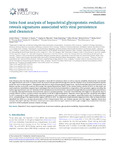2022-02-02Zeitschriftenartikel
Intra-host analysis of hepaciviral glycoprotein evolution reveals signatures associated with viral persistence and clearance
Gömer, André
Brown, Richard J. P.
Pfaender, Stephanie
Deterding, Katja
Reuter, Gábor
Orton, Richard
Seitz, Stefan
Bock, C.- Thomas
Cavalleri, Jessika M. V.
Pietschmann, Thomas
Wedemeyer, Heiner
Steinmann, Eike
Todt, Daniel
Even 30 years after the discovery of the hepatitis C virus (HCV) in humans there is still no vaccine available. Reasons for this include the high mutation rate of HCV, which allows the virus to escape immune recognition and the absence of an immunocompetent animal model for vaccine development. Phylogenetically distinct hepaciviruses (genus Hepacivirus, family Flaviviridae) have been isolated from diverse species, each with a narrow host range: the equine hepacivirus (EqHV) is the closest known relative of HCV. In this study, we used amplicon-based deep-sequencing to investigate the viral intra-host population composition of the genomic regions encoding the surface glycoproteins E1 and E2. Patterns of E1E2 substitutional evolution were compared in longitudinally sampled EqHV-positive sera of naturally and experimentally infected horses and HCV-positive patients. Intra-host virus diversity was higher in chronically than in acutely infected horses, a pattern which was similar in the HCV-infected patients. However, overall glycoprotein variability was higher in HCV compared to EqHV. Additionally, selection pressure in HCV populations was higher, especially within the N-terminal region of E2, corresponding to the hypervariable region 1 (HVR1) in HCV. An alignment of glycoprotein sequences from diverse hepaciviruses identified the HVR1 as a unique characteristic of HCV: hepaciviruses from non-human species lack this region. Together, these data indicate that EqHV infection of horses could represent a powerful surrogate animal model to gain insights into hepaciviral evolution and HCVs HVR1-mediated immune evasion strategy.
Dateien zu dieser Publikation

